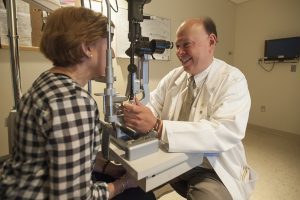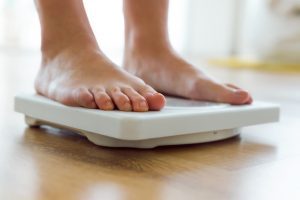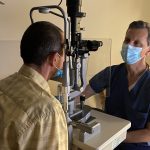Often called the “silent thief” of vision, glaucoma is a group of diseases that damages the optic nerve gradually — and often without any warning signs.
The best way to save your sight from glaucoma is to catch it early, through regular comprehensive dilated eye exams. However, research studies have also supported some lifestyle changes to prevent glaucoma (and a few other diseases, too).
We sat down with Louis R. Pasquale, M.D., Director of the Glaucoma Service at Mass. Eye and Ear*, who offered 7 tips for glaucoma prevention.
1) Eat lots of leafy green vegetables.
 An observational study that followed 100,000 patients for 26 years found that boosting intake of leafy greens is associated with a reduced risk of developing primary open-angle glaucoma.
An observational study that followed 100,000 patients for 26 years found that boosting intake of leafy greens is associated with a reduced risk of developing primary open-angle glaucoma.
Glaucoma damages the optic nerve, which carries visual information to the brain. Increased pressure from fluid in the eye or impaired blood flow to the optic nerve are thought to be hallmark causes of glaucoma. Leafy greens are loaded with nitrate, which your body converts to nitric oxide. Nitric oxide helps maintain optimal blood flow and potentially keeps eye pressure low. Eating two salads a day with romaine and leafy greens can lead to a 60 percent reduction in developing paracentral glaucoma.
Bottom line: Fill your plate with leafy green vegetables—not only can this help prevent glaucoma, but it is also linked to lower rates of inflammation, cancer, heart disease and macular degeneration.
2) Protect your eyes from the sun—and start young.
 When you’re out in the sun, your eyes have to process a large number of light rays. Inevitably, some harmful UV rays will come your way. These UV rays could contribute to the formation of exfoliation material in the anterior segment of your eye, clogging the drain and dialing up pressure in the eye. Less eye exposure to the sun will likely result in fewer cataracts and will help prevent exfoliation glaucoma. And, although genes play a significant role in glaucoma development, sun exposure is still important. As Dr. Pasquale explains, “Environment loads the gun and common gene variance executes the plan.”
When you’re out in the sun, your eyes have to process a large number of light rays. Inevitably, some harmful UV rays will come your way. These UV rays could contribute to the formation of exfoliation material in the anterior segment of your eye, clogging the drain and dialing up pressure in the eye. Less eye exposure to the sun will likely result in fewer cataracts and will help prevent exfoliation glaucoma. And, although genes play a significant role in glaucoma development, sun exposure is still important. As Dr. Pasquale explains, “Environment loads the gun and common gene variance executes the plan.”
Where you live in the world also influences your exposure to the sun and may contribute to developing glaucoma. According to a paper published in 2011 by Dr. Pasquale and colleagues, the sun bounces off of the ground and into the eye in more angles the farther away you get from the equator.
Bottom line: Throw some sunglasses on when you go outside, and make sure your kids have them on, too.
3) Keep your teeth clean.
 Each tooth has its own microbiome, which Dr. Pasquale believes could generate some kind of inflammatory biomarker. He and a team of researchers studied more than 40,500 male health professionals over 26 years, and they found a positive association between recent tooth loss from periodontal disease and primary open-angle glaucoma. The thought here is that periodontal disease stimulates the immune system, making glaucoma worse.
Each tooth has its own microbiome, which Dr. Pasquale believes could generate some kind of inflammatory biomarker. He and a team of researchers studied more than 40,500 male health professionals over 26 years, and they found a positive association between recent tooth loss from periodontal disease and primary open-angle glaucoma. The thought here is that periodontal disease stimulates the immune system, making glaucoma worse.
Bottom line: Brush your teeth twice a day and make regular visits to your dentist to keep your teeth (and your eyes) in top shape.
4) Get your blood sugar in check.
 If your doctor tells you your blood sugar is borderline, you should get it under control. Although it’s controversial about whether or not type 2 diabetes is a risk factor for primary open-angle glaucoma, a worldwide analysis of the data says the answer is yes. Dr. Pasquale conducted a study in 2006 that indicated there is something about insulin resistance that contributes to the glaucoma disease process. People with higher blood sugars in turn have higher eye pressures, which we know is a contributor to the development of glaucoma.
If your doctor tells you your blood sugar is borderline, you should get it under control. Although it’s controversial about whether or not type 2 diabetes is a risk factor for primary open-angle glaucoma, a worldwide analysis of the data says the answer is yes. Dr. Pasquale conducted a study in 2006 that indicated there is something about insulin resistance that contributes to the glaucoma disease process. People with higher blood sugars in turn have higher eye pressures, which we know is a contributor to the development of glaucoma.
Bottom line: Primary care physicians are starting to focus on patients whose blood sugars are borderline. Getting your numbers in check might help prevent glaucoma, and it certainly won’t hurt to be in the healthy range to avoid other disease risks as well.
5) Exercise in moderation.
 Exercise is known to lower intraocular pressure and produce plenty of cardiovascular benefits. Ultimately, moderate exercise will only improve your overall health.
Exercise is known to lower intraocular pressure and produce plenty of cardiovascular benefits. Ultimately, moderate exercise will only improve your overall health.
But the key here is “moderate”—some data suggests that exercising to exhaustion is bad for glaucoma, as it may overstress the cardiovascular autoregulatory system.
Bottom line: Exercise moderately to lower your intraocular pressure and improve other aspects of your health. Avoid exercising to exhaustion and certain types of exercises, particularly inversion postures in yoga. Postures such as balancing on your head stress the auto regulatory systems, making it hard for the eyes to handle as blood rushes to your head.
6) If you have a family history of glaucoma, get checked early and often.
 If you have a family history, your risk of developing glaucoma is increased by at least three-fold. In conjunction with folks around the world, Mass. Eye and Ear researchers are discovering that many genes lead to glaucoma. Research is revealing that carrying more of these associated genes translates to developing the disease at an earlier point in time. As such, it’s important to understand that glaucoma is not a disease of the elderly. For Caucasians, it is a disease of middle age, and for African Americans, it’s a disease of even earlier age.
If you have a family history, your risk of developing glaucoma is increased by at least three-fold. In conjunction with folks around the world, Mass. Eye and Ear researchers are discovering that many genes lead to glaucoma. Research is revealing that carrying more of these associated genes translates to developing the disease at an earlier point in time. As such, it’s important to understand that glaucoma is not a disease of the elderly. For Caucasians, it is a disease of middle age, and for African Americans, it’s a disease of even earlier age.
Bottom line: Find out if glaucoma runs in your family, and if it does, you should have a comprehensive dilated eye exam every one to two years.
7) Maintain a healthy body weight.
 Patients with a very high Body Mass Index (BMI) have higher pressure in their eyes, and those with a really low BMI are at risk for primary angle glaucoma, as pressure around the brain is low and pushes the optic nerve inward. You don’t want to have too little or too much weight—you should aim to be right in the middle if possible.
Patients with a very high Body Mass Index (BMI) have higher pressure in their eyes, and those with a really low BMI are at risk for primary angle glaucoma, as pressure around the brain is low and pushes the optic nerve inward. You don’t want to have too little or too much weight—you should aim to be right in the middle if possible.
Bottom line: The key here is to have a healthy body weight right in the middle of the spectrum. Those who are at extremes are often there for genetic reasons, and it can be hard to alter your weight. If you have an issue maintaining a healthy body weight, start by talking to your primary care physician.
At the end of the day, there are a variety of factors that contribute to our glaucoma risk. These 7 habits may lower your risk of developing glaucoma, and they will certainly improve your overall health.
*Dr. Pasquale is now Site Chair of Ophthalmology at Mt. Sinai Hospital in New York. For glaucoma care at Mass. Eye and Ear, please call 617-925-5145 or request an appointment online.




Re point 5: it sounds right to exercise in moderation, and Dr. Pasquale has given us the reason why.
Very informative.
Is fish oil or suppliments beneficial for glaucoma ??
I have had Bells Palsy for Ten Years With My Right Eye Remaining So Wide Open They Had To Suture it for some closure. I was diagnosed with Glaucoma 8 years ago but Zioptan kept my pressure 12-13 until my doc wanted to try a shot in my eye which wasn’t zioptan. My right eye pressure exploded to 38 & now he wants to put a stent in but I do not as I see it as another experiment bound to fail. I just want to stay on zioptan & get back to 12-13 pressure. Do you know of any better treatments othe than the stent? Thank you.
Hi Deborah, thanks for your comment, we can’t give medical advice through our blog but encourage you to contact your doctor. If you’d like an appointment with a Mass Eye and Ear glaucoma specialist, contact 617-573-3202.